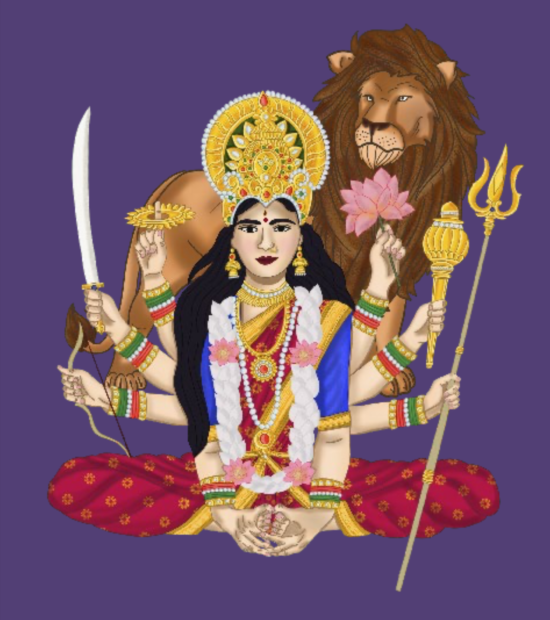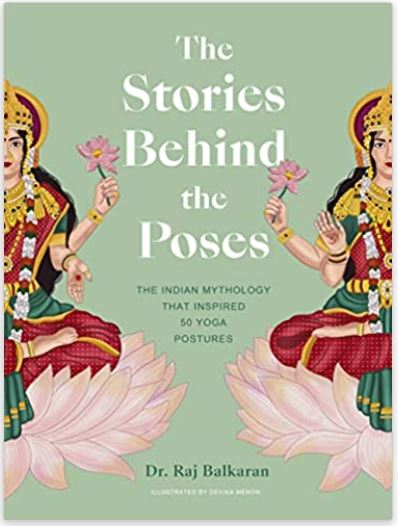This excerpt is from the book “The Stories Behind the Poses”, by Dr. Raj Balkaran, shared with permission by the author. Illustration by Devika Menon.
Dr. Raj Balkaran will feature this and other stories at the upcoming SOYA Annual Retreat, June 2-4, 2022. We can’t wait to host him and see all of you in Sorrento! Order your own copy of his book Stories Behind the Poses here on Amazon. You can read Rebecca’s blog post featuring how to practice Bhadrasana here.
Storytelling is an essential way that humans process, understand and share our lived experiences. We tell stories all the time, and they are used for many purposes. We tell the story of our day, the story of our history, and the story of what it is we see around us. Stories help us to understand history or events. They provide ways to introduce and provide insight into concepts like morality, ethics and values. We use them to entertain one another or ourselves. We tell stories to remember and honour that which we love and cherish. One could argue that everything is a story.
Sometimes we can become trapped in the stories we tell ourselves, and lose track of what is real and what is not real. We experience suffering if we become stuck in the never ending loop of attachments and desires.
One essential teaching in the yoga philosophies is the concept of maya. Maya is the great illusion, and refers to this very world we live in. In maya, we are bound in the world of attachments. Attachments and desires are what bind us to the cycle of karma and reincarnation.
Because of maya, we experience ourselves as being separate from the Divine. To experience freedom from maya is to experience the Divine itself. It is the experience of the ultimate freedom, Oneness.
In his book, Dr. Balkaran shares a wonderful story about a king and a merchant that have much in common, despite coming from vastly different worlds. This tale is one of the mythological stories represented in the asana, Bhadrasana, also known as the Throne Pose.
Having lost everything they loved in their lives, exiled and alone, a king and a merchant find themselves in the same ashram. Both of them are in despair, and despite the fact that they were cheated by their very people, they find themselves wondering after the welfare of their respective communities. Seeking solace, they turn to the sage. They ask him to shed light on the nature of their pain:
“Well, noble king,” began the sage, “this is a simple thing. All creatures are attached. We live in this world under the illusion of separation, propelled by attachment to those we care about. Desire is the seed of creation. We are all part of this great matrix of life, under the spell of the great goddess Mother Maya who deludes all beings. But Mother Maya is also Mother Wisdom, both which are aspects of the formidable Mother Durga! She may delude you with the play of the world,but she can just as easily remove the veil. She is the source of all power, the Lady of Lords, Queen of Kings, sovereignty itself!”. Mesmerized, the king requested to know more.
The sage shared the heroic tales of the Goddess Durga, who has many times battled bravely the demons that try to destroy this world and that of the gods. And in those stories we learn that she is both maya and freedom from maya:
“And so,” concluded the sage, “by the great goddess are you and this merchant deluded, and it is by her grace you can be freed. She is the source of all power in the universe, the power of maya and the power of wisdom. Take refuge in her, worship her, and your desires will be fulfilled.”
Following the sage’s wise insights, the king and the merchant together worshipped the goddess Durga devoutly for three years, chanting and offering many gifts of water, scents, fruits, flowers and flame.

Pleased by their penance, the goddess appeared before them and granted them each a boon of their choosing. The merchant humbly asked her for the supreme knowledge that results in transcendence of “I-ness” and “my-ness.” He sought liberation from material creation. The king, on the other hand, wished for the return of his kingdom.
The goddess granted the boons they sought. The merchant was liberated from the world of maya entirely. The king, after a lifetime of ruling his beloved country, was reincarnated in his next life as a great enlightened soul.
When we invoke this story within the pose Bhadrasana, the Throne Pose, we can remember this story. Maya is upheld by the Divine, and through the Divine we can be freed from maya, even while we remain in this world.
The world is the very body of the great goddess. Hers is the work of kings in that she safeguards the collective welfare on the heavenly sphere, just as the king does here on Earth. Enlightenment and illusion, moksha and maya, both are divine, for without the world of separation, name and form, souls could not exhaust their karmas and learn their lessons. Although the goddess is regal, and safeguards the throne of Indra and earthly kings like Suratha, she does not herself occupy a throne. Above and beyond being a sovereign, she is sovereignty itself. The great kings in these tales draw their royal authority from the wellspring of power that is the Mother Divine, source of all things. Remember this as you engage this pose, with poise, power, and humility before the greatness of the goddess.
You’ll find the whole story in Raj’s book, “The Stories Behind the Poses”.

Dr. Raj Balkaran is a renowned wisdom teacher, storyteller and scholar of ancient Sanskrit narrative texts. He teaches at several online platforms including the Oxford Centre for Hindu Studies and at his own School of Indian Wisdom where he integrates scholarship, storytelling and spirituality to apply ancient Indian wisdom teachings to modern life. He is a spiritual adept, having received multiple initiations and having been engaged in daily spiritual practice for over two decades. Dr. Balkaran serves as McMaster University’s Chaplain of Indian Spirituality and runs a thriving private life counsel practice where he helps guide people on their journeys. He also hosts the New Books in Indian Religions podcast where he interviews academics on their cutting-edge research. See https://rajbalkaran.com for more information.


Recent Comments